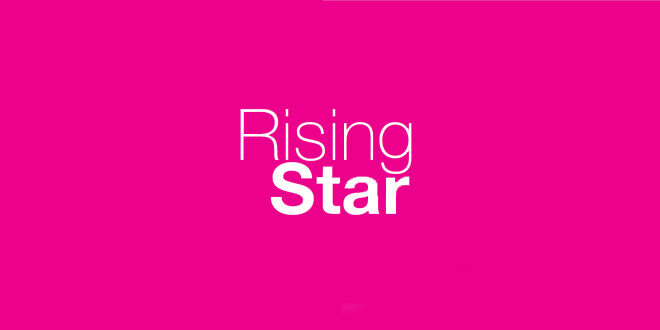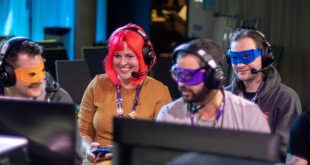 Eva Kioseoglou, junior programmer at The Chinese Room, tells us how she went from making a 2D adventure game in Unity by herself to working in the games industry full-time with the help of the Sumo Digital Academy.
Eva Kioseoglou, junior programmer at The Chinese Room, tells us how she went from making a 2D adventure game in Unity by herself to working in the games industry full-time with the help of the Sumo Digital Academy.
How did you get into programming?
After I finished my masters in particle physics, I decided to retrain as a backend programmer and took on a software developer position in FinTech. Then the pandemic hit, which meant spending many hours at home, catching up on all the video games I didn’t have the chance to play before! In my free time, I also started attending online events, where I first heard about the Sumo Digital apprenticeship programme. However, at the time this was all a distant dream. Landing a job in the games industry without a relevant degree seemed impossible.
Further down the line, I found myself between jobs. I had just made my first game, a small 2D adventure made in Unity, and it was such an enjoyable experience (apart from the painful bit where I had to create my own assets in Photoshop… art is definitely not my strong suit!) that I decided to check out that apprenticeship I had heard about. Turns out, applications had opened two days earlier! I went through the application process and a few months later I found myself in the Sumo Digital Academy, learning all about C++ and game programming alongside a cohort of wonderful apprentices! At the end of this programme, I did a 12-week placement with The Chinese Room, who offered me a job afterwards. When I tell you I jumped around like a kangaroo at a dance party in my small at-home office when I got the news…
What has been your proudest achievement so far?
Getting to work alongside other apprentices to build our very own game engine from the ground up was definitely the highlight of my time at the Sumo Academy. It was no small feat, as we had only been on our game programmer journey for about four months when we were given this task. But you know what? We pulled it off, and I owe a big chunk of my technical know-how to that project. We created an engine we can be proud of, and also got to take it for a spin and use it to prototype our own game!
What has been your biggest challenge?
I have high expectations of myself and I often struggle with the notion that there is still so much out there for me to learn. There are many aspects of game programming I would like to explore in depth, and a finite number of hours in the day. When I find myself feeling overwhelmed by these thoughts, I try to remind myself that I am only at the start of this journey and that continuous learning goes hand in hand with being a programmer. Game engines and programming languages are constantly evolving, so why wouldn’t we?
What do you enjoy most about programming?
I love the applied, hands-on nature of programming, and science in general. It is what initially drew me towards experimental particle physics as opposed to the more abstract theoretical side of things. It is also why I decided to pursue the programming pathway after university. There is something profoundly gratifying about learning through application.
What’s your biggest ambition in games?
I aspire to delve deeper into low-level engine code and graphics programming, in order to help my team produce the absolute best works of art possible!
As a side goal, I would like to contribute all I can towards making the industry a more welcoming space for under-represented groups. We should be doing a better job empowering individuals of all backgrounds to join our industry.
What advice would you give to someone else aspiring to work in games?
It’s easy to get discouraged given the competitive side of looking for a job in games. My advice is to focus on yourself and your own growth as a developer. Identify the area of game development that you enjoy the most and keep refining your skills, carefully curate your portfolio, stay up to date with trends and tools and do your research on the different pathways into the industry. There are more options than you think!

 MCV/DEVELOP News, events, research and jobs from the games industry
MCV/DEVELOP News, events, research and jobs from the games industry




